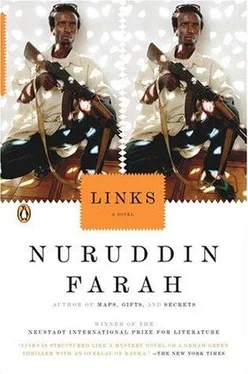A hungry dog, its emaciated tail between its skinny legs, followed him. It kept a safe distance, its nose close to the ground, but its eyes focused mainly on him. The dog was on full canine alert, Jeebleh noted, ready to take off at the slightest hint of threat. It stopped and waited whenever he paused to take another look at the piece of paper, and didn’t move until after he had resumed walking. Jeebleh relived the incident with the Alsatian. He hadn’t thought he would get into trouble or risk being shot at if he stepped in to prevent a spoiled brat, the son of some minor warlord, from torturing a dog. He hadn’t counted on having to deliver the puppies, but he was glad he had been there.
With the bush dog still following, Jeebleh came upon several sick-looking goats. Then he saw a cow taking famished bites of a plastic bag and swallowing it, and watched as she coughed, like someone with a chest ailment. After this, he saw two elderly men lifting their sarongs until they showed their bare bottoms, preparing to defecate in full view of the road. When he had lived here, this behavior would have earned a reprimand or an immediate fine if someone from the municipality had seen them emptying their bowels.
A little later, he and his canine companion came upon a throng of men gathered around something on the ground. Jeebleh decided this was a curious crowd, and not likely to turn into a mob. But why were some of them bearing clubs and others firearms? Was it for self-protection? He could see the men concentrating on the same spot and pointing. Was it a corpse, the carcass of a dead goat or some other, more unusual animal? Before getting any closer, he made sure that he knew where the hungry dog was, worried that he might be held responsible if it bit someone, or went berserk at the sight of a corpse or a carcass. He stopped within reach of the dog, just in case he was forced to intervene.
What distinguished him from the men in the crowd, apart from the fact that he had neither a club nor a firearm, was that they were all wearing sarongs. He had on trousers.
The men made space for him, and he moved forward with the mindset of a man prepared for peril, all the while wondering whether it was wise to enter what might be a trap set to lure strangers like him into it. And yet he went forward. All at once a man with a prominent gap in his upper teeth blocked his path.
“Are you a doctor?” GapTooth demanded.
“I am not.”
Heads turned and stared, and many of those at the back of the crowd craned their necks to see. Were the men more interested in him than in the man who lay unconscious on the dusty ground, his body in a tortured posture, folded into his sarong? GapTooth volunteered the information that the man on the ground had just had an epileptic seizure. “But no one in this neighborhood knows him, or knows where he comes from or why he has had an attack and fallen right where he is lying.”
Jeebleh assumed that GapTooth had advised everyone in the crowd to keep a safe distance from the epileptic, a meter at least. But he was not saying anything of the kind to Jeebleh.
There was a rawness about the way the crowd looked at the fallen man, who lay unconscious, his eyes scarily wide open, his legs apart, and his lips traced with dried saliva. A tall, bald man standing to Jeebleh’s left wondered aloud if there was a divine purpose to the presence, in their midst, of an epileptic. This set several of the men to talk all at once. BaldMan intervened, hushing them, and said, “If there is a divine message, what is it? That we’re out of control? Handicapped? Brain-dead? Stuck in some state where we’re neither living nor dead?”
Those present turned themselves into a debating society, with several men reacting viscerally to what BaldMan had said. It seemed he was someone they listened to, even if his pronouncements were meant to be provocative, or downright offensive to many there. The talk shifted from the epileptic as a divine message to Jeebleh’s presence among them.
GapTooth, pointing at Jeebleh, said to BaldMan, “But what of this man, here? Do we know who he is? Is it a matter of time before he falls sick and drops forehead first into a heap of nervous disorder? Will his eyes begin rolling, his teeth clench, and will his tongue stiffen like a bridle in a horse’s mouth? Will his breathing become noisy, will froth run with the blood coming out of his mouth? Will he fall into a convulsive fit, lie unconscious on the ground, and when he opens his eyes, not recognize any of us? Will he remember our conversation? Will he die mysteriously, leaving the problem of where to bury him? I would say that the man lying unconscious on the ground, whom we are shunning, has more things in common with us than this newly arrived stranger here, who is upright, on his feet, and apparently healthy, walking through here in his trousers with his mangy dog. It is this man we should be worried about!”
Heads turned back and forth, eyes focused now on Jeebleh, now on the epileptic. Two possible scenarios came to Jeebleh’s mind, in instantaneous reconfiguration. In one, the crowd turned into a mob. In the other, he was taking part in a TV game show in which the contestants pressed buzzers when they were ready to answer.
GapTooth asked, “If you’re not a doctor and you’re not sarong-wearing, and you do not suffer from epilepsy, then who are you?”
Trusting his instinct, he replied, “I am a guest.”
“Of the epileptic?” asked GapTooth.
“No, I am Bile’s guest!”
“Bile, the doctor?”
“That’s right.”
“Have Raasta and Makka been found, then?” GapTooth said.
“Who are they talking about?” someone called out from the fringes of the crowd. “What manner of name is Raasta? It is not Muslim, not even Somali.”
“Have you not heard of the Protected One?” someone next to him said.
“I haven’t had the pleasure,” the man said.
Before Jeebleh could speak, another man stepped forward. “The trouser-wearing stranger in our midst is new to the city, as you can obviously see. But at least he is no enemy and no threat to us, if he is Bile’s guest. And I am sure most of you have heard of the Protected One, Bile’s niece, and the Simple One, both missing for a while now. Unless you do not listen to the BBC Somali Service?”
Another man admitted to not having heard of Raasta.
“A pity you haven’t had the luck to meet either the Protected One or the Simple One,” GapTooth said rather theatrically. Jeebleh couldn’t tell whether some of them were teasing one another, as friends do. They could’ve been actors manqué, for all he knew, performing an impromptu play, staged for the benefit of anyone who happened to be passing.
With his hand extended to Jeebleh, GapTooth said, “Please remember me to the kind doctor when you see him next. And I hope, for our sake, that we find Raasta healthy and unharmed.”
“What’s your name, so I can give it to Bile?”
“Alas, I have no name by which I wish to be known in these terrible times,” GapTooth said, “nor do I answer to my old name, because of the associations it has for me nowadays. Possibly, the good doctor would know who I was if I resorted to my former name, but I would rather wait until peace has come to stay.”
“I understand,” Jeebleh said, even if he didn’t.
At the mention of Bile’s name, the crowd had begun to relax, and so had Jeebleh. But he reminded himself that it was when you dropped your guard that someone could hurt you. He imagined panic descending on him in the unlikely form of a faint heart, his own. Then he felt ill at ease, and began perspiring, until the sweat soaked through his shirt, and his back became too wet for comfort. He kept his panic under check, even though he was short of breath and nervous. Finally he plucked up enough courage and then knelt to check on the epileptic. A man with a front-row view of the spectacle asked if there was nothing he could do for the poor man.
Читать дальше












